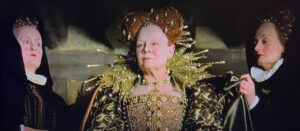
Judi Dench as Elizabeth I in Shakespeare in Love, Miramax Films
This week is the sort for me in which a beloved family pet may need to be put down, I have to have crowns put in, and someone whom a friend calls The Ruiner (because the person ruins everything, as if it is a superpower) has been at it again.
One of the more interesting ways The Ruiner has ruined something is to denounce TV/film comedies such as The Office as lies, because things turn out well in the end. It is true, of course: in real life, Michael would have been fired for racial or sexual harassment; Dwight would have hurt somebody for real; and Pam would have turned out to have had a sexual, as well as emotional, affair with the cameraman for years and ruined her relationship with Jim.
We know, by way of mortality, that happy endings are never the last word and so are false. But does that make comedy invalid? Isn’t it self-justifying and self-fulfilling for The Ruiner to think so? (My own twisted bent these days is to ponder the idea that all narratives are lies cherry-picked from the welter of life’s data.)
It is true that when bad things happen and you find yourself in a mood, it can be hard to find something to watch or read, because so many stories grate as false. This made me think of one of the writer John Gardner’s ideas about “moral fiction”: that great art is defined as something a person dying of a dread disease could view or read and still find interest and comfort in.
Shakespeare in Love worked well enough for my mood this week. The film is twenty-five years old now and holds up. More importantly, the writing by Marc Norman and Tom Stoppard (for which they won an Oscar) is crisp, flawlessly-paced, and does not take itself too seriously, even in its tendency to be self-referential. It works in many of the conceits of Elizabethan drama, such as cross-dressing and a ghost come to accuse, as it also plays with our backward-glancing desire to know how genius creates something like Romeo and Juliet. The only clunker I detected in the entire thing is a line I should love, since I am a Pee-wee Herman fan: “Have a care with my name, you’ll wear it out,” says Elizabeth I.
Emma (1996) was Gwyneth Paltrow’s fourteenth film but for me was her first star turn; Shakespeare (1998) made her a classic type, as Shakespeare’s muse and great love. Joseph Fiennes is good as the young Shakespeare, in the same year as his film Elizabeth, mostly by being exuberant and romantic. The excellent cast also includes Ben Affleck, Geoffrey Rush, Judi Dench, Simon Callow, Rupert Everett, Tom Wilkinson, and many others. Colin Firth seems miscast as bad-guy Lord Wessex, except that he is great at it and delivers the funniest line of his career, after telling the unwilling Lady de Lesseps (Paltrow) that he has come to a financial agreement with her father for her hand, and says in all seriousness, “You may show your pleasure.”
The most interesting thread in the film to me now is a question about writing’s ability to portray love itself. (A meme that went around a while back says, “Romeo and Juliet is not a love story. It’s a three-day relationship between a thirteen-year-old and a seventeen-year-old that caused 6 deaths. Sincerely, everyone who actually read it.”)
The incredible Judi Dench, as a bored and snappish Elizabeth, says, “Playwrights teach us nothing about love. They make it pretty, they make it comical, they make it lust. They cannot make it true.” Yet she agrees to judge a large wager between Wessex and Shakespeare (in drag but whom she recognizes), as to whether a playwright can portray “the very truth and nature of love.”
Most of the film is comedy, some of it broad, such as the motif of slop buckets being emptied around Geoffrey Rush as he escapes having his feet broiled on a brazier for nonpayment of debts. But the film mostly gets away with showing the passion and hope of new love, as art is made by a company.
How will it end? It is no mystery: We know love this idealized must diminish if not end badly. Queen Elizabeth, after judging in favor of the power of young Shakespeare’s new play, must tell Viola de Lesseps to get on the boat with her new husband Wessex, whom Elizabeth scorns, and sail for Virginia. The film may end in marriage, but it is tragedy to the players.
The last scene suggests that writing from this longing and being written about, are love’s real rewards, an eternal glory that defies parting’s sorrow, aging, and even death itself. That sounds like a happy ending, of sorts. Is it true? It may be necessary, which is a different thing.
